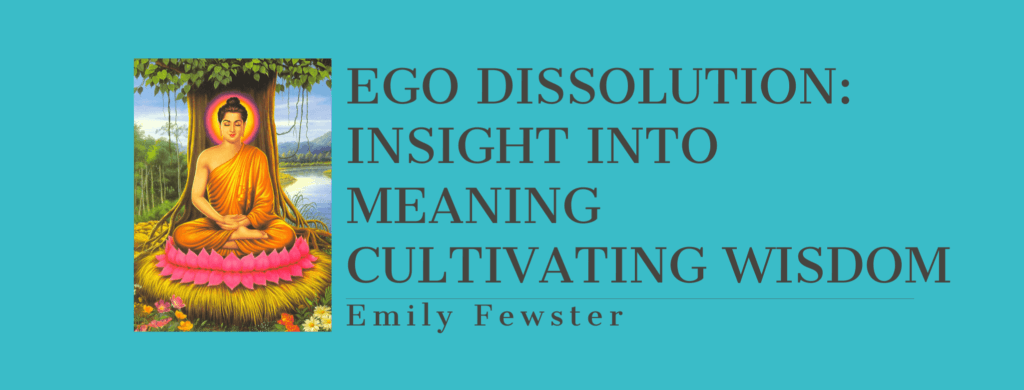According to the early Buddhist, most of us are like junkies, fuelled by desire into addictive behaviour. The particular addiction that we suffer from is self-authorship. We are however, in the final analysis fictions who would live better lives if we gave up desire, and were motivated by compassion instead.
In recent times, society has placed much higher importance on this addiction. Especially with the development of social media, we have been conditioned to desire more; more power, money, cars, likes, or followers. In other words, more ego-centric lifestyles. Unsurprisingly, the mental health crisis has been strongly correlated with social media use. Alongside the mental health crisis, there exists many others; however there is one that is interrelated to all of them: the meaning crisis. University of Toronto professor John Vervaeke states that this crisis results from the lack of wisdom needed to cultivate meaning, and has led to a resurgence in seeking that wisdom through the study of ancient philosophies and practices. In particular, the intersection of Buddhist philosophy/practice and cognitive science has been on the rise.
That intersection will be used to promote how states of ego dissolution offer a means of insight into an objectively more meaningful life. This will be done by illustrating the illusion of the ego and its role in governing the perception of reality, how over activity of the ego and self-authorship leads to suffering, and how long term changes in line with the Noble Eightfold Path often result from practicing and achieving states of ego dissolution.
The brain, simply speaking, is a complex system of neurons, which form connections with other neurons to create neural networks. One of these networks is called the Default Mode Network (DMN). It is the neurological basis for the self, dealing with autobiographical information: memories of collection of events and facts about one’s self. Scientists have shown that under psychedelic induced transcendent states, this network is drastically compromised, which results in a state of conscious awareness with no concept of subjective self. During this network shutdown, activity in other areas of the brain increases in an attempt to make sense of the experience resulting in visions, distortions of time and space, and feelings of unity and interconnectedness with all. The result of these states of temporary ego dissolution is neurogenesis, the growth and development of neural tissue and connections, which is in layman’s terms a literal change of perspective. The implications of this suggest that the ego plays a much larger role in governing our perception of reality, and it is, like Nāgasena claimed, an illusory, dissolvable entity.
The First Noble Truth of Buddhism acknowledges the presence of suffering and The Second Noble Truth identifies the cause of all suffering is desire and ignorance. Desire could be that for material items, pleasure, or immortality, a sort of ‘ego -continuum’. “Gods and men delight in existence, take pleasure in existence, rejoice in existence, so that when the Doctrine for the cessation of existence is preached to them, their minds do not leap toward it, are not favourably disposed toward it, do not rest in it, do not adopt it… Thus, O priests, do some fall short of the truth.” Ignorance on the other hand, relates to not seeing the world as it actually is.
Without the capacity for mental concentration and insight, Buddhism explains, one’s mind is left undeveloped, unable to grasp the true nature of things. Vices, such as greed, envy, hatred and anger, derive from this ignorance. In conjunction with the argument above, an ignorant individual would be someone who’s neural networks have not had the opportunity or experience of confronting difference or change and have thus become rigid, resulting in a rigid view of the world and rigid upholding of their views as “true.” Suffering takes on many forms, however one of the most studied and prevalent states of suffering today is classified as “depression”. One study sought to investigate the relationship between depression and a measure of self-authorship. As researchers predicted, there was a positive relationship between the two and the role self-authoring plays on maintaining and/or exacerbating depression was discussed.
Even on a neurological level over activity of the ego, or DMN, seems to play a role in depression. As previously mentioned, one of the regions comprising the DMN is the medial prefrontal cortex. This area is significant in depression, with one study showing a decrease of cortical thickness in the right ventral medial prefrontal cortex results in depression in preschoolers and these reductions in volume “may result from the disruption and atrophy of neurons and glia in depression…”
In those who constantly ruminate with certain self-narratives, whether self-deprecating or narcissistic, these neural pathways become ingrained in the brain like sleds in the snow, constantly moving over the same route. States of ego dissolution, it seems, is like the fresh snowfall that allows your mind, the sleds, to explore other pathways. One way to achieve this is when one grasps the fourfold emptiness of the statement “I am nowhere a somewhatness for any one, and nowhere for me is there a somewhatness of any one” and come to “not seek after form…sensation…perception… consciousness, nor attach himself to it, nor make the affirmation that it is his Ego. And these five attachment-groups, not sought after and not become attached, long inure to his welfare and happiness.”
Unsurprisingly, this idea has neuroscientific backings. Many studies have shown the long term benefits of a psychedelic experience, but one study identifies that the transformative experience of ego dissolution and social connectedness mediate these effects. It can be criticized that this approach relies too heavily on internal states of awareness and being, and not of external doing. For example, Marx and Engels account of what is meaningful places heavy emphasis on desire, work, production, and achieving unalienated labour. However, by illustrating that through internal states of unattachment we may be glimpsing a more unfiltered version of reality, that over activity of the ego leads to suffering, and that working to dissolve said ego leads to increases in compassion and welfare, what is here argued is that states of ego dissolution offer insight into how to cultivate a meaningful life.
Whether through the tried and true course of meditation and Buddhist practice or through the crash course of a psychedelic experience, there exists enough empirical evidence and ancient insight to support these ideas. Once those see things for as they truly are, not governed by the lens of the ego, they are introduced to the notion that many entities they thought of as concrete; time, death, the self, are illusionary boundaries separating us from the greater reality and are shown the way of the Eightfold Path to end suffering. However, these states can only show you the path; it is up to the individual to walk it.


Superb post but I was wondering if you could write a litte more
on this subject? I’d be very grateful if you could elaborate
a little bit more. Bless you!
Hi! Thank you for your comment 🙂 I’ve linked external information and resources in the text of the post